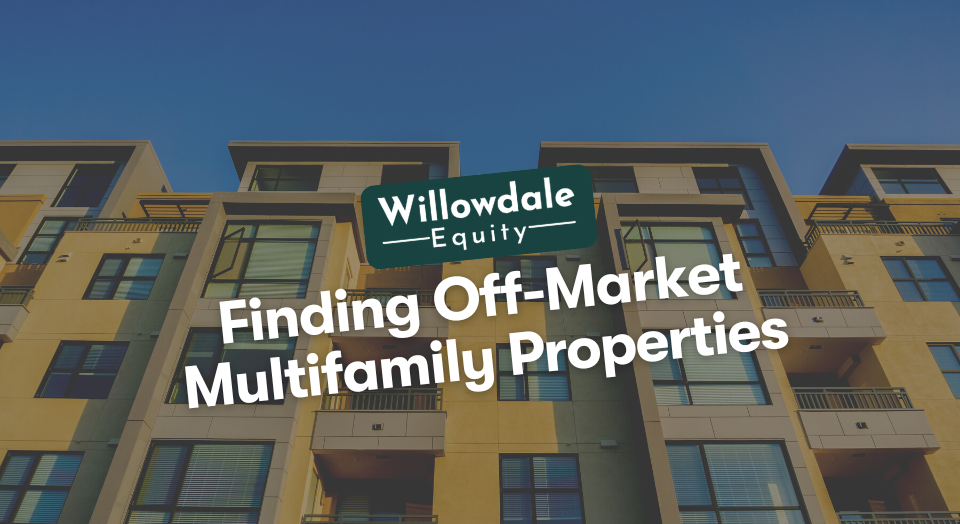
How to Find Off Market Multifamily Properties in 2024
This article is part of our passive investors guide on real estate syndications, available here.
Out of more than 4 million multifamily properties in the United States, only about 5,000 are usually on sale at any particular time. Compared to the number of prospective buyers, it’s tough to find an active listing without an offer from another buyer.
Many owners may not be actively looking to sell their multifamily properties but wouldn’t say no to an attractive offer. These properties that aren’t listed on public platforms but whose owners would listen to enticing offers are what we call off-market properties.
In today’s article, we’re going to look at ways you can use to find multifamily properties to invest in in 2024.
Key Takeaways
-
If you’re interested in off-market commercial real estate, there are other real estate data providers where you can find properties that aren’t listed on the MLS. These databases provide users with property owners’ contact information, fundamental market and submarket data, sale comps, rental comps, listings availability, and other resources to help you buy investment properties.
-
Be on the lookout for signs that the property owners are behind maintenance, such as overgrown lawns.
-
Wholesalers can be instrumental in helping you find great multifamily off-market deals. These real estate professionals talk to owners selling their properties and get them under contract by getting the seller to sign a purchase and sale agreement.
How to Find Multifamily Properties Off Market

There are many ways to find multifamily off-market properties. You can decide to follow one after another until you find what works for you or use a combination of several strategies.
These strategies include:
- Talk to brokers
- Driving for dollars
- Wholesalers
- Commercial real estate data providers
- Calling for rent signs
Let’s look at these strategies individually.
1.) Talk to Brokers
Real estate brokers have networks in multifamily property owners’ circles. Though the owners may not be willing to sell initially, your broker can help you approach them, make an irresistible offer and convince them to sell. If your broker is hungry enough, they may even cold call property owners in your area of interest and show them that the market is favorable for selling.
Besides, most of brokers usually have pocket listings. Pocket listings are also off-market properties for sale but only reserved for motivated buyers. These listings aren’t listed on public platforms, but the broker has exclusive selling rights.
Sellers may choose to have their properties as pocket listings to prevent the word from going out. Other reasons may be to keep the sale private due to financial issues or emergencies.
Remember that getting off-market deals from a broker may be hard at first if you’re a beginner. This is because most brokers usually have an established list of close buyers to whom they market their off-market deals. However, with time, you can establish yourself as a serious real estate investor and slowly network into these insiders’ lists.
2.) Driving for Dollars

As the name suggests, this strategy involves driving around neighborhoods looking for potential deals. Once you spot an interesting property, look for the owner, find their contact details, and reach out to them, stating your intention.
Spotting multifamily properties isn’t that hard since they stand out from the rest. These properties will primarily have several front doors and cars in the driveway. Be on the lookout for signs that the property owners are behind maintenance, such as overgrown lawns.
Remember, your goal is to reach out to prospective sellers. Don’t just drive by. Take note of the property address, condition, and the number of units. Ensure you enter this information in a spreadsheet or real estate CRM (customer relationship management) software.
While you can knock on the door and speak to the resident, you might not speak to the owner since these properties are mostly rental units and typically not owner-occupied. The tenant may also not have an idea of who the owner of the property is or their contact details.
The best thing is that everything is now online. You can enter the property’s address on the county tax assessor’s website and get the landlord’s details. This information can help you send the property owner a direct mail or find their phone number and call them.
3.) Wholesalers
Wholesalers can be instrumental in helping you find great multifamily off-market deals. These real estate professionals talk to owners selling their properties and get them under contract by getting the seller to sign a purchase and sale agreement. They then sell the contract to a willing buyer for a higher price to profit, and that’s okay if you see the value that lies within the deal.
Most wholesalers deal with off-market properties since they can negotiate to get them under contract for a lower price. You can talk to a wholesaler to give you access to an off-market deal.
If you follow this strategy, ensure you perform some high-level due diligence to determine what kind of renovations and repairs the property will need. Most of these properties usually need rehab, and some wholesalers may underestimate the costs to make the deal sweet.
Also, note that this strategy may not get you the best bargain possible. The wholesaler is in the business for a profit, so they must sell the property at a higher price than what they got it for.
4.) Commercial Real Estate Data Providers
If you’re interested in off-market commercial real estate, there are other real estate data providers where you can find properties that aren’t listed on the MLS. These databases provide users with property owners’ contact information, fundamental market and submarket data, sale comps, rental comps, listings availability, and other resources to help you buy investment properties.
Here are some of the best commercial real estate data providers:
- Reonomy: It provides predictive analytics so users can analyze investment properties and gather the most reliable and accurate data for potential investments. Besides the property details, Reonomy also lists information about the tenants, lender, mortgage, and contact information.
- CoStar: This commercial real estate database provides you with the best reporting tools for customization. It also has features that allow you to create financial projections and models. CoStar provides various resources for diverse real estate professionals, such as multifamily owners, investors, brokers, agents, lenders, appraisers, and retailers.
- CRE Collaborative: CRE Collaborative is one of the best databases for real estate investors and professionals looking for an integrated platform with customer relationship management (CRM) software. It provides all kinds of real estate data and updates it to ensure that the data is always accurate.
5.) Calling For Rent Signs

Landlords eventually sell their property sooner or later. Some property owners go through a personal financial setback, run into problematic tenants, or any other situation that may compel them to sell their properties.
This strategy involves calling the numbers on calling for rent signs and telling the owner or property manager that you’re interested in buying.
The key to this strategy is the right timing. This means you have to be consistent. You might not be lucky with the first calling for rent sign. However, if you keep doing it long enough, you eventually call a landlord at the right time. Calling enough property owners guarantees that you’ll find a few landlords who have been thinking of selling their properties.
6.) Networking With Other Investors
Networking in investor circles gives you access to many off-market multifamily deals. Many sellers who don’t want to list their properties publicly usually ask investors whether they’d be willing to buy. The word then spreads in the groups.
The best thing about getting to know these off-market properties from fellow investors is that you can make a direct offer to the seller, which increases your odds in negotiating with the seller in many cases. If a deal makes sense, you don’t have to care about where it comes from.
To find off-market deals, you can leverage fellow investors to pick their brains to find out their investment strategies, how they source for deals, and whether they’re currently looking to buy or sell. These are essential in putting you in a great position to invest in off-market properties.
Off-market properties from other investors are great deals due to the following reasons:
- The investor is already interested, meaning it’s a good deal
- Negotiations may be smoother since you already know the investor
- You’ll save money in agent commissions since you won’t have to use a real estate broker for the deal
- The investor might return the favor in the future
Keep in mind that this strategy is highly dependent on relationships. You need to establish good relationships with highly active investors in the real estate business so you can tap into the relationships when looking for off-market multifamily properties.
Frequently Asked Questions About Off-Market Multifamily Properties
The best website to find multifamily properties would be LoopNet, followed by sites like Crexi, Trulia, and Zillow.
Yes. Multifamily properties are some of the best real estate investments you can make during a recession. Over many market cycles, the multifamily asset class has proven to produce strong risk-adjusted returns and keep pace in high inflation markets like the 1970s and 2021, 2022, for example.
Off-market properties often provide better opportunities for buyers, as working with a seller directly provides flexibility when negotiating, lower expenses since you can skip commissions, and the opportunity to avoid cut-throat competition from other investors.
How to Find Off-Market Multifamily Properties - Conclusion
Off-market multifamily properties are a great investment that can withstand the effects of a recession. You can choose to source these deals using either of the strategies that we broke down in this article or a combination of several to see more results.
It’s important to note that just because a property is off-market doesn’t mean it’s automatically a great deal. If your interested in passively investing in value-add multifamily properties across the southeastern United States and accessing our educational resources, join the investor club today.
Sources:
- BiggerPockets, “How to Find an Off-Market Multifamily Property“
- FitSmallBusiness, “6 Best Commercial Real Estate Databases for 2022“
Interested In Learning More About PASSIVE Real Estate Investing In Multifamily Properties?
Get Access to the FREE 5 Day PASSIVE Real Estate Investing Crash Course.
In this video crash course, you’ll learn everything you need to know from A to Z
about passive investing in multifamily real estate.
We’ll cover topics like earned income vs passive income, the tax advantages, why multifamily, inflation, how syndications work, and much much more!




